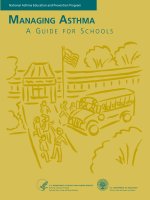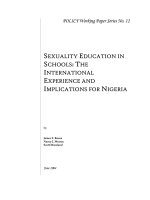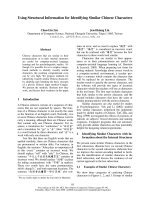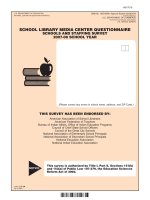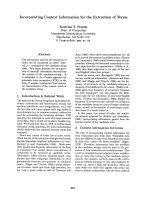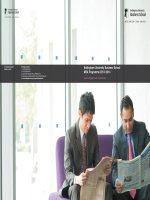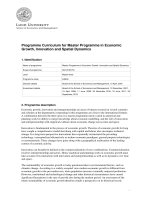school experience programme Information for schools
Bạn đang xem bản rút gọn của tài liệu. Xem và tải ngay bản đầy đủ của tài liệu tại đây (158.74 KB, 18 trang )
School Experience
Programme
Information for schools
September 2015
Contents
Introduction
3
Background and history
4
Programme protocols and processes
5
Eligibility
5
Access
6
Programme structure
8
Funded programme
8
Non-funded programme
8
Cancellation policy
9
Funding
10
Public facing notes
11
Good practice
12
Contact us
17
2
Introduction
This information note aims to support schools in the delivery of the School
Experience Programme (SEP).
School experience is vital to candidates looking to enter initial teacher training (ITT),
as many ITT providers, School Centred Initial Teacher Training providers (SCITTs)
and School Direct lead schools now ask for a minimum amount of experience of
working with young people prior to application. Candidates are expected to show
that they have a good understanding of the role of a teacher, give examples of
creative and innovative teaching styles they have observed and discuss how they
may tailor lessons to cater for students with different abilities and backgrounds. They
are also often tested on their knowledge of the national curriculum for their subject,
and general teaching pedagogy. A good quality school experience prior to
application can help them evidence this.
For schools involved in School Direct, having candidates into the school on school
experience visits is also a fantastic opportunity to meet potential applicants, and we
know that 80% of School Direct schools involved in the School Experience
Programme to date use it to assist with their recruitment
“Many thanks…for… introducing us to the School Experience Programme back in
February. We’ve now had several potential trainee teachers (applicants for 2014 and
potentially 2015) observe lessons here at Broughton through the SEP programme.
We invite the potential trainee teachers to observe lessons on days that suit our
school and departments, they gain valuable observation days that they require for
their UCAS application, we promote the Preston Teaching School Alliance and we
get PAID too! We hope to utilise the scheme more next year, as it is a win win
situation”.
(Sandra Duggan, Broughton Business and Enterprise College, Preston)
3
Background and history
The School Experience Programme has been in operation from September 2011
and was developed in order to provide central access to school experience for
candidates in priority subject areas who were wishing to apply for ITT so that they
could make a strong application to ITT that evidenced work with children and young
people in a school environment.
The introduction of the School Experience Programme portal in September 2012
has allowed this scheme to be managed and administered through a central
database, which has vastly improved the efficiency and usability of the programme
for schools. In the 2014/15 academic year alone, the programme catered for over
5000 candidates and 12,000 placement days.
The overwhelming success of the programme has allowed for further developments,
and from September 2014, the School Experience Programme portal also allowed
schools to offer placement days in non priority subjects (although these do not
attract funding from the Department for Education, ) alongside the traditionally
funded programme.
From September 2015, the School Experience Programme is expanding to allow
primary schools to join the programme and offer primary placement days. Primary
placements will also be managed through the central database. These placements
will not attract funding from the Department for Education.
4
Programme protocols and processes
In the move to a school-led system, it is important that schools have as much autonomy
as possible to design and deliver the experience that is offered to candidates. However,
as a national offer with attached funding, there are a few protocols that we expect
participating schools to align themselves with:
Eligibility
Registration for both the funded and non-funded School Experience Programme (SEP) is
open to all of the below, on the condition that they are not in special measures:
•
All mainstream secondary schools
•
Maintained secondary special schools
•
Secondary Academies
•
Sixth Form Colleges
•
Secondary Pupil Referral Units
•
Secondary Free schools
Primary schools
Please note that many providers expect candidates to evidence experience across two
key stages. If your school cannot offer this, it should be made clear in your placement
notes and candidates should be advised to check with their chosen provider prior to
booking a place with you.
Schools that do not offer placements within a 6 month period will be marked on the
system as ‘Dormant’. ‘Dormant’ schools will need to contact the SEP team to re-activate
their registration if they then wish to begin to offer placement dates.
5
Access
Funded programme
From September 2014, the Department for Education introduced a procedure to
prescreen candidates and check suitability prior to allowing them access to the funded
School Experience Programme. This means that all candidates accessing the funded
programme will have, as a minimum, stated to us that they:
•
intend to apply for initial teacher training this year (for 2016/2017 entry)
•
have Maths and English GCSE at Grade C or above (or equivalent)
•
have, or are expected to have, a minimum of a 2:2 in a degree which is relevant to
the subject they wish to teach, or sufficient A level qualifications to enable them to
progress with their application with some subject knowledge enhancement ( SKE)
support if appropriate ( />
•
have had less than 10 days school experience in an English state school in the
past 12 months
For the academic year 2015/16, the priority subjects that will be included in the school
experience programme are:
Biology
Chemistry
Computing
Geography
Maths
Languages
Physics
Please note that as government priorities change, priority subjects may change. Schools
will be given prior notice of any amendments.
6
Non-funded programme
The non-funded programme will be open to candidates in priority subjects that have not
met all of the above eligibility criteria, including those who are not intending to apply for
ITT until the following year (eg second year undergraduate students) and so this is an
ideal opportunity to meet potential candidates for future years and ‘keep them warm’ for
application to your school or partnership.
The non-funded programme will also be accessible to candidates in the following
subjects, who have an intention to apply to ITT within the current academic year:
Art & Design
Business Studies
Classics
Design & Technology
English
History
Music
General*
Physical Education
Religious Education
Social Studies
*(this category can be used if you offer a programme which is not subject specific but
provides experience across your school, or in subjects not listed above, which will need
to be specified in your placement notes)
Primary
From September 2015 the non-funded programme will also be accessible to candidates
wanting to teach primary and who have an intention to apply to ITT within the current
academic year, and who meet the following criteria :
•
have Maths,English and Science GCSE at Grade C or above (or equivalent)
•
have, or are expected to have, a minimum of a 2:2 degree
•
have had less than 10 days school experience in an English state school in the
past 12 months
7
Programme structure
The School Experience Programme will facilitate the matching of schools and candidates
for the first day of their placement within a school.
Funded programme
•
Following the 1 day initial placement, schools will be expected to discuss
individual requirements with each candidates and to offer additional days to these
candidates up to a maximum of 10 days.
•
When the additional days take place is for negotiation and discussion between
the school and candidate.
•
There is no requirement as to how schools structure placement dates – you may
wish to run block placements or a more flexible system.
•
It will be up to your school to decide how many candidates it can offer a positive
placement experience to and you may wish to offer placement to more than one
candidate at a time. (Schools and candidates have fed back that multiple
placements provide peer benefits and we would welcome schools offering multiple
placements).
•
If there is a restriction on the number of additional days your school will be able to
offer on any placement, you should state this up front in your public placement
notes in order to set an appropriate expectation for the candidate.
•
If after your first day with a candidate you are unable to offer further days through
unforeseen circumstances, or you feel it is not appropriate to do so, you should
inform the participant. You should also contact the SEP team on the Get into
Teaching Line number – 0800 085 0962, giving details of why your school is
unable or unwilling to offer additional days.
Non-funded programme
•
It will be at the school’s discretion as to how many days are offered to candidates
– the portal will allow for a matching on the initial day only and then further days
are for the school and candidate to negotiate.
•
If you do offer a structured programme with a set number of days, or particular
dates, this should be referenced in the public placement notes section so that a
candidate knows in advance what they are signing up to.
8
Cancellation policy
We do understand that although placements are offered in good faith, there are
occasionally unforeseen circumstances that arise that mean a school needs to cancel a
particular booking.
We would ask that you give the SEP team as much notice as is feasibly possible if you
do need to cancel a particular day – they will need to re-arrange a placement for that
candidate, who may be relying on gaining their school experience in the immediate future
in order to evidence it in their ITT application. They may have booked time off work or
organised childcare to accommodate their placement days.
We continuously monitor cancellations and therefore will speak to any school that
produces high numbers of cancellations to discuss their capacity to deliver the
programme at that time.
We work hard to ensure that cancellations from candidates are few and far between, but
we do understand that this happens from time to time, and our concellation policy below
seeks to compensate for this.
For the funded programme, cancellations are recompensed according to the table below:
Cancellation
Payment due
Participant cancels 3 or more days in advance of
the placement taking place
No payment due to school
Participant cancels 2 or less days in advance of
the placement taking place
Day 1 placement payment due to
school
Placement cancelled by school
No payment due to the school
Participant does not turn up for 1 day placement
and does not inform the school or the Get into
Teaching Line
1 day placement payment due to
school
Participant does not turn up for their additional
1 day payment due to the school
placement days and does not inform the school or
the Get into Teaching Line
9
Funding
In order to simplify the funding structure of the programme and ensure schools are not
penalised for offering more days, the funding structure from September 2015 will be as
follows:
•
Schools will be funded per day for every candidate that they host on the School
Experience Programme in priority subjects (see page 10) at a rate of £35 per day,
up to a maximum of 10 days.
•
Schools will also be able to claim for a Disclosure and Barring Services
(DBS) check for each candidate that undertakes more than 1 day in their
school if this is required at a flat rate of £60.
•
We allow candidates to be eligible for the funded programme for up to 10 days
experience. If they have not reached this quota in their original school but it is felt
they would benefit from further days, we will allow them to go into another school.
However, if they have already attracted funding for a DBS check through our
system, we will require them to sign up to the DBS Update Service (for more
information see link://www.gov.uk/dbs-update-service) at a cost to themselves of
£13 and therefore they will not be eligible for further DBS funding through the
Department for Education.
•
Please note that schools should look to process DBS payment promptly once the
check has been processed, as only one claim per candidate will be allowed and
any delay in processing this may result in the funding being given to a follow up
school placement.
•
As this programme is supported by the Department for Education, candidates
should not be charged any additional monies for their attendance.
•
Any school that hosts 20 initial days or more on the School Experience
Programme within a calendar month will be eligible to claim a £500 block booking
bonus.
•
You will only receive an invoice for payment once the placement has been
completed and feedback received.
For the non-funded programme, schools will not receive any payments from the
Department for Education, but it is at a school’s discretion if they wish to levy a charge for
attendance to a candidate. This must be stated upfront in the public notes section of the
portal.
10
Public facing notes
On the School Experience Programme portal for both funded and non-funded
programmes, schools are able to enter notes at both school and placement level.
School notes should contain information on things such as:
•
school status (e.g. are you an Academy, Voluntary Aided, etc)
•
any engagement with Initial Teacher Training that you have (e.g. are you a School
Direct lead or partner school or do you offer placements for Mainstream initial
teacher training programme.
•
links to latest Ofsted reports and your school website or any other information you
would like candidates to read about your school as a whole
Placement notes should include:
•
what time candidates should turn up for their placement day and where and to
whom they should report
•
what candidates need to bring with them (eg proof of identification, necessary
paperwork for DBS check)
•
if there are any limitations in terms of the number of further days on offer
•
if you only offer experience within 1 Key Stage and therefore candidates need to
check with their chosen provider on suitability prior to booking
•
for the non-funded programme, if there is any charge for the programme and how
this should be paid
•
any detail on school experience placements that are recorded as ‘General’ in the
system
Please note that a link to the placement notes that you write will be included in the
candidate’s booking confirmation email, and the more comprehensive these are, the less
likely it is that a candidate will need to phone the school in advance of the placement to
check on logistics.
Thank you for your interest in the School Experience Programme, and we wish you
every success in your delivery. For more information on how to access and work
the School Experience Portal and claim payments for the funded programme,
please contact the School Experience Programme team on 0800 085 0962 or email
11
Good practice
Through our evaluation and review processes around the School Experience Programme
over the past number of years, we have gathered invaluable feedback from candidates
and schools on what makes for a successful school experience from both perspectives.
Here are some key points that have arisen from feedback from candidates who have
attended SEP as to what makes for a beneficial experience that they can evidence on
application for an ITT place to help any schools that wish to begin to, or further develop,
their offer:
•
Arrange opportunities for discussion with teachers so that the candidate can ask
questions.
•
Make sure the day has structure and is planned and organised in advance.
•
Ensure the host teachers are fully aware of the visit and are prepared, and are on
board with hosting SEP placements to ensure the experience is positive for the
candidate.
•
Remember that the candidate is interviewing the school too, which is particularly
important for School Direct schools.
•
Try and allow the candidate to observe a variety of lessons, age ranges and ability
groups.
•
Give the candidate the opportunity to interact with students and participate in
lessons where appropriate.
•
Be prepared to confirm in writing that the candidate has undertaken school
experience at your school.
•
If possible, allow the candidate to be exposed to other areas of teaching outside
the classroom (e.g. lesson planning, departmental meetings, etc)
12
We also get regular feedback from schools on their programmes, and here are some
extracts from case studies highlighting schools that work extensively with School
Experience Programme and the benefits that it brings to them:
Ryan Galletly, Subject Leader of Physics, has been leading the School Experience
Programme at Richard Challoner School in Surrey since 2012. Here he offers his
thoughts and insights into the benefits and challenges of running the programme.
What appealed to you in getting involved with the School Experience Programme?
With the introduction of School Direct, I knew that our school would become responsible
for appointing trainee teachers and shaping their training to suit our needs. The School
Experience Programme is an invaluable way of seeing potential candidates in action and
for us to be able to potentially ‘cherry-pick’ the right people.
As an experienced member of staff, I also feel strongly that we have a moral obligation to
give something back to the profession. It can be very difficult to get initial experience
within a school and cold-calling doesn’t always work. Had it not been for the good will of
the schools that hosted myself and my colleagues when we were first starting out then
we would not have become teachers, so it only seems right that we continue that good
will. This is an ideal way to create new opportunities for people wishing to explore
teaching as a career.
Being involved in the School Experience Programme has also generated some additional
income for the school, which has allowed us to purchase class sets of iPads, laptops,
new textbooks, novels, and some sophisticated equipment for the science and maths
departments.
How have you found the School Experience booking process (including using the
Portal) and the support you have received from the School Experience team at
NCTL?
The School Experience Programme has been a fantastic new initative to get involved in. I
have loved the opportunity to meet new individuals who are interested in the teaching
profession. It is really interesting to meet people from all walks of life who have wonderful
life stories to tell about how they have come to the conclusion that teaching is for them.
The portal is unbelievably easy to follow, and as long as you have a spreadsheeet to
keep track of all the visits then you will find it stress free. However, should you run into
any problems then the School experience team are only a phone call away and their help
is invaluable.
13
What does a typical School Experience at your school consist of for participants?
A typical day at our school consists of participants arriving by 8:30am and signing into the
office. Their documents are checked and they are given a lanyard with a specific colour
so staff know who they are. They are then asked to stay in the staffroom while they are
handed timetables and meet their Heads of Department. Official lessons start at 9:15, but
we ask them to come earlier as this gives them time to meet the department staff and
other people on the course.
The participants will observe lessons and also have free time in order to complete tasks
that will help them in the interview process. Here is a list of some of the tasks that they
are asked to complete when they are not observing lessons:
Task 1 - Write me an essay about why your subject should be taught in the national
curriculum.
Task 2 - Research what is the difference between setting, streaming and mixed ability.
Task 3 - A group task called the Zin Obelisk to assess ability to work in a group.
Task 4 - Personal statement template guidance.
Task 5 - Prepare answers to common teacher interview questions.
Task 6 - Participants will be asked to hit the books and work through some A-level books.
Task 7 - Given a template they will have to plan a lesson on their chosen topic.
Task 8 - Prepare answers to scenarios that are real life situations that a teacher may
encounter in the classroom.
Task 9 - Write me an essay on what are the characteristics of an outstanding teacher
Task10- Research the curriculum and how it is changing
I believe that observation on its own is not enough to fully prepare candidates for
interview, so I set up these tasks to further develop their understanding of the job that we
do and to expose them to some of the daily challenges and decisions that we have to
make.
Further to this experience, we have set up three individual time slots per week for the
participants to have professional studies lectures by a very experienced member of
senior leadership who is in charge of Teaching and Learning. From my experience this
has always been the part of the experience that participants find the most enjoyable and
14
useful. This is a time for them to fully engage in discussion about pedagogy and teaching
strategies.
At the end of the teaching day, I like to have a quick chat with the participants about how
the day was and if they have any advice for me on how to run the programme better. It is
sessions like this that has shaped the programme that we run today.
What are the benefits to your school in engaging with the School Experience
Programme?
We are able to meet potential candidates and discuss with them their aspirations and
career plans. This allows us to offer placements to candidates who we feel will
complement the ethos of Richard Challoner and identify well with our students.
Another benefit is that the vast majority of candidates are extremely helpful, eager and
keen to participate in the classroom. They make an invaluable contribution and provide
additional support to students within the classroom.
Would you recommend the programme to other schools?
Yes and I have done! I feel that the School Experience Programme offers a win-win
situation for schools. Staff take extra care with their lesson planning and gain confidence
about having visitors and observers in their classrooms. Students benefit from wellprepared lessons and we gain an additional, enthusiastic adult within the school for the
duration of the placement.
If we want to attract the right sort of people to become teachers, then schools need to
take advantage of this type of programme. Offering the School Experience Programme
provides potential trainees with an opportunity to see if teaching is for them, but equally,
it allows schools to see if trainees are right for them.
15
Caroline Carroll, Teaching School Administrator, has been co-ordinating the
School Experience Programme at Millais School in Horsham since 2012. Here she
shares her experience and considers the benefits of running the programme.
What appealed to you in getting involved with the School Experience Programme?
We already had an established practice of hosting school observations, more so since
the higher education institutes started to make it a pre-PGCE requirement. We welcomed
the opportunity to run these observations on a more formal basis, and to gain small
amounts of revenue for the departments hosting the visitors.
How have you found the School Experience booking process (including using the
Portal) and the support you have received from the School Experience team at
NCTL?
The portal was a huge improvement in terms of invoicing, dates etc and the support from
SEP has always been exemplary and constant.
What does a typical School Experience at your school consist of for participants?
Visitors are picked up from reception and taken to the relevant curriculum area. They are
sent a timetable and a booklet before their visit. The booklet gives them various
exercises to enable them to focus their observations and gain a greater understanding of
the teaching methods they are watching. They observe six lessons and sit with their
subject area at lunch so they can chat and ask questions.
What are the benefits to your school in engaging with the School Experience
Programme?
Teaching staff, especially in Mathematics where they have hosted a lot of visitors, say
they have become so accustomed to having observers in the classroom that it has
become second nature. This has had a positive effect in terms of confidence levels for
other observations by the senior leadership team and OFSTED, as and when they arise.
16
Staff have also mentioned that speaking to visitors about their motivations for entering
the teaching profession has reminded them of their own original enthusiasms and
reasons.
Increasingly, we are finding that the link between the School Experience Programme and
School Direct is strengthening as School Direct grows. It has provided us with an
opportunity to see the potential of possible applicants in a classroom situation, and to
determine whether they would be suitable for School Direct. In addition, we have
contacted other local schools for feedback if they have hosted an applicant on SEP.
Finally, some visitors have gained initial teacher training places following their extended
visits and I think staff are pleased to have played a part in that successful journey.
Would you recommend the programme to other schools?
Yes. We have encouraged all of the schools in our Teaching School Alliance to register
by advertising this in our monthly newsletter. We have highlighted the positives at every
opportunity.
Contact us
If you have any queries or are interested in joining the programme please contact the
SEP team to register on 0800 085 0962 or email
If you experience any complaints relating to the School Experience Programme please
contact:
If at any stage of your engagement with the School Experience Programme you would be
interested in showcasing the work of your school through a case study please contact the
SEP team on 0800 085 0962 or email
and they will pass your details on to the relevant team within the Department for
Education.
17
© Crown copyright 2015
This publication (not including logos) is licensed under the terms of the Open
Government Licence v3.0 except where otherwise stated. Where we have identified any
third party copyright information you will need to obtain permission from the copyright
holders concerned.
To view this licence:
visit
www.nationalarchives.gov.uk/doc/open-government-licence/version/3
write to
Information Policy Team, The National Archives, Kew, London, TW9 4DU
About this publication:
enquiries www.education.gov.uk/contactus
download www.gov.uk/government/publications
Reference:
[000-000-000]
Follow us on Twitter:
@educationgovuk
Like us on Facebook:
facebook.com/educationgovuk
18

